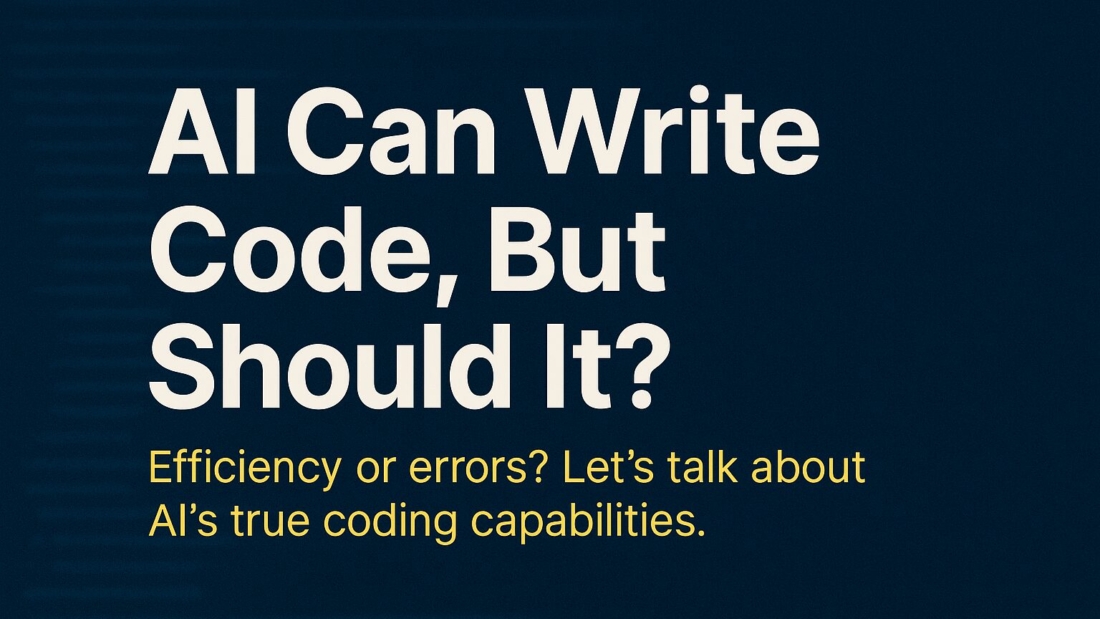Artificial Intelligence has made huge strides in the developer world. Tools like GitHub Copilot, ChatGPT, and other code-generating models can now write working snippets of code, automate boilerplate generation, and even suggest bug fixes. But as the hype continues to grow, the question looms large: just because AI can write code — should it?
For developers, CTOs, and business leaders, understanding the limits of AI-assisted development is no longer optional — it’s strategic.
The Rise of AI Code Assistants
GitHub Copilot, powered by OpenAI’s Codex, was a game-changer when it launched. Soon after, ChatGPT added contextual code assistance to its already powerful NLP toolkit. These tools can:
Autocomplete functions in real time.
Generate entire files based on prompts.
Help debug with explanations in plain English.
Speed up documentation and testing.
Their appeal is obvious — productivity skyrockets, and developers can focus on higher-level thinking. But this efficiency comes at a cost.
What AI Does Well in Code
Before we talk about the risks, let’s acknowledge the power of AI in development:
1. Speeding Up Repetitive Tasks
AI tools shine in repetitive coding tasks — think writing CRUD operations, testing templates, or formatting data. They can slash hours of work into minutes.
2. Boosting Junior Devs
For less experienced developers, AI tools act like senior mentors. They help understand syntax, propose better practices, and guide problem-solving — all in real time.
3. Accelerating Prototyping
Need to mock up a quick front-end or API? AI can help create a working draft that teams can then iterate on.
4. Assisting with Legacy Code
Tools like ChatGPT can interpret old, undocumented code — helping teams maintain software more efficiently.
But here’s the catch: none of these replace the human brain — at least, not yet.
Where AI Falls Short in Dev Work
1. Lack of Context
AI doesn’t understand the full scope of your project or business logic. It works within the context you give it — and often, that’s limited to a few lines of code or a vague prompt.
The result? Code that works syntactically but fails strategically.
2. Security Blind Spots
AI doesn’t know your security protocols or compliance requirements. It may suggest insecure patterns, omit input validation, or introduce vulnerabilities like SQL injections — all unknowingly.
3. Over-Reliance and Skill Degradation
When developers become too reliant on AI to write code, they risk losing touch with the fundamentals. Debugging AI-generated code becomes harder when you don’t fully understand how it was written.
4. License and IP Concerns
Who owns AI-generated code? Is it safe to deploy in production? Many tools pull from public repositories — and the legal landscape around code ownership is still fuzzy.
The Human Factor: Judgment, Strategy, and Innovation
At its core, coding is not just about syntax — it’s about solving business problems with technology. AI can assist, but it cannot replace:
The architectural thinking required to design scalable systems.
Strategic decisions aligned with business goals.
The creativity to invent new solutions or experiences.
Even in highly technical tasks like performance optimization, human insight is irreplaceable.
So, Should You Use AI for Coding?
The answer isn’t black or white. Here’s a more strategic perspective:
✅ Use AI for:
Prototyping and scaffolding.
Repetitive or boilerplate code.
Syntax corrections and suggestions.
Exploring alternatives and learning.
🚫 Don’t rely on AI for:
Final production code without review.
Security-sensitive or compliance-heavy systems.
Business-critical logic.
System architecture or performance optimization.
Tips for Developers & Teams Using AI Tools
Treat AI suggestions like intern code — useful, but never blindly accepted.
Implement code reviews as standard — especially when using AI-generated output.
Establish coding standards that AI output must adhere to.
Use version control rigorously to monitor AI’s contributions and roll back if needed.
Stay sharp — keep learning core concepts, even if AI helps with execution.
What This Means for Businesses in 2025
Business leaders must understand that AI coding tools amplify developer capabilities, but don’t replace developers. Your tech strategy should factor in AI, but not depend on it blindly.
At LogIQ Curve, we help companies harness the best of both worlds: AI-accelerated development combined with human expertise, quality assurance, and strategic oversight. AI is a tool — and tools are only as good as the people who use them.
Conclusion
AI can write code. But should it?
Yes — if you’re using it wisely, reviewing its output, and applying human judgment. No — if you’re expecting it to replace experience, strategy, and real-world problem-solving.
In the future, the most successful development teams won’t be AI-free — they’ll be AI-augmented.
Let LogIQ Curve help you strike that balance — where innovation meets responsibility.

